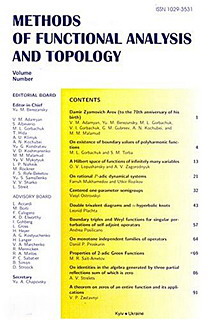D. Z. Arov
Search this author in Google Scholar
Generalized solutions of Riccati equalities and inequalities
D. Z. Arov, M. A. Kaashoek, D. R. Pik
MFAT 22 (2016), no. 2, 95-116
95-116
The Riccati inequality and equality are studied for infinite dimensional linear discrete time stationary systems with respect to the scattering supply rate. The results obtained are an addition to and based on our earlier work on the Kalman-Yakubovich-Popov inequality in [6]. The main theorems are closely related to the results of Yu. M. Arlinskiĭ in [3]. The main difference is that we do not assume the original system to be a passive scattering system, and we allow the solutions of the Riccati inequality and equality to satisfy weaker conditions.
Realizations of stationary stochastic processes: applications of passive system theory
MFAT 18 (2012), no. 4, 305-331
305-331
In the paper, we investigate realizations of a $p$-dimensionalregular weak stationary discrete time stochastic process $y(t)$ asthe output data of a passive linear bi-stable discrete timedynamical system. The state $x(t)$ is assumed to tend to zero as ttends to $-\infty$, and the input data is the $m$-dimensional whitenoise. The results are based on author's development of the Darlington method for passive impedance systems with losses of thescattering channels. Here we establish that considering realizationfor a discrete time process is possible, if the spectral density $\rho(e^{i\mu})$ of the process is a nontangential boundary value ofa matrix valued meromorphic function $\rho(z)$ of rank $m$ withbounded Nevanlinna characteristic in the open unitdisk. A parameterization of all such realizations is given and minimal,optimal minimal, and *-optimal minimal realizations areobtained. The last two coincide with those which are obtained by Kalman filters. This is a further development of the Lindquist-Picci realization theory.
Maximal solutions for embedding problem for a Generalized Schur function and optimal dissipative scattering systems with Pontryagin state spaces
MFAT 7 (2001), no. 4, 69-80
69-80

